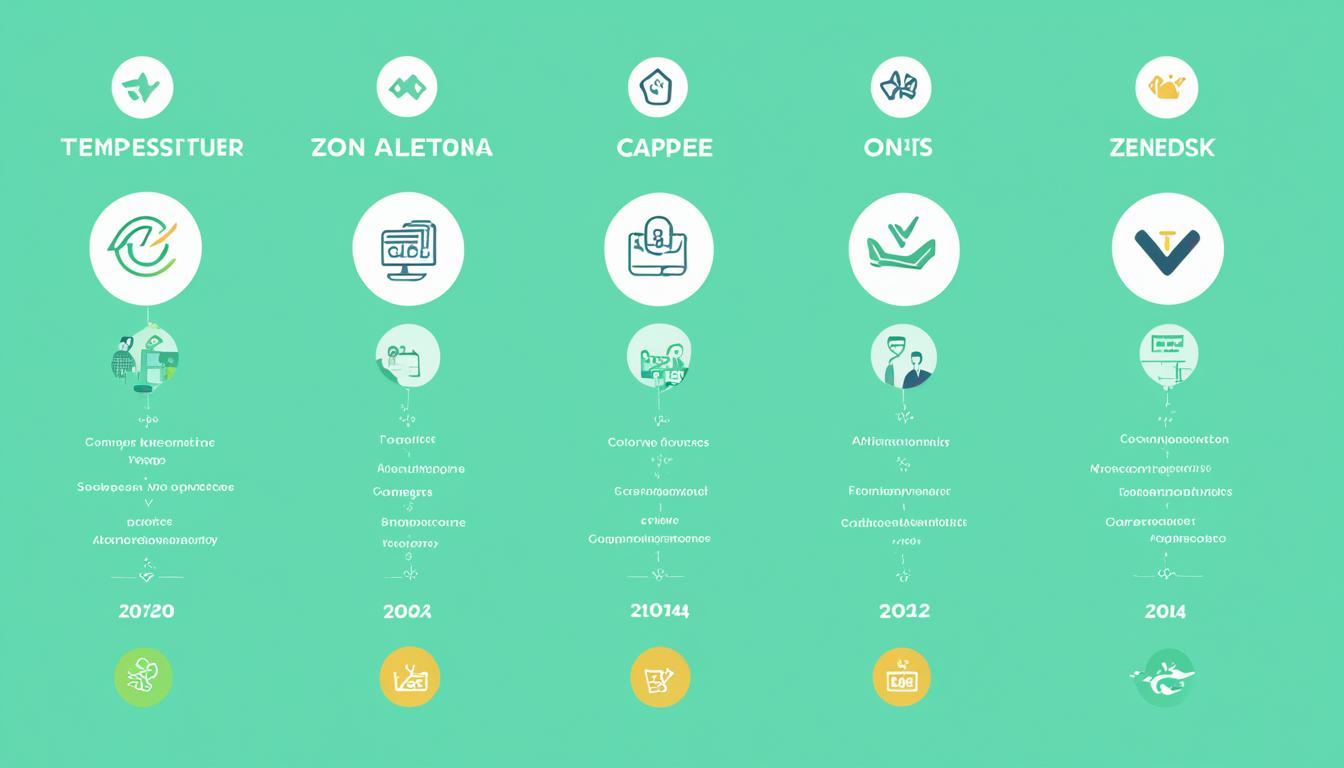Meta Platforms, formerly known as Facebook, is a dominant force in the social media industry. But in the ever-evolving landscape of social media, there are several strong competitors and alternatives that businesses should be aware of. This article will delve into the world of Meta competitors, providing valuable insights and analysis to help businesses stay ahead.
Competitor analysis, competitor research, and competitor comparison are crucial components of staying competitive in any industry. By tracking and analyzing the strategies and performance of Meta’s competitors, businesses can gain valuable insights that can inform their own strategic decisions. Understanding the competitive landscape is key to success.
In this article, you will discover the top Meta competitors and alternatives that are shaping the social media landscape in 2024. From established tech giants to emerging players, we will explore their strengths and weaknesses, providing you with the competitor insights necessary to make informed decisions.
Competitor tracking is an essential aspect of staying ahead in the dynamic world of social media. By keeping a close eye on the strategies and innovations of Meta’s competitors, businesses can adapt and refine their own approaches. This article will equip you with the tools and knowledge to effectively track and analyze your competition.
Don’t miss out on the opportunity to gain a competitive edge. Join us as we explore the top Meta competitors and alternatives in 2024. Stay informed, stay ahead.
Alphabet (GOOGL, GOOG)
Alphabet, the parent company of Google, is a major competitor to Meta Platforms. Both companies are large-cap computer and technology companies. Alphabet offers diverse products and services, including its renowned search engine and advertising platform, making it a dominant player in the tech industry.
When considering Alphabet alternatives, businesses and investors may look for companies that provide similar services or have the potential to disrupt Alphabet’s market dominance. While Meta Platforms primarily focuses on social media, Google’s capabilities extend to various technological areas, including cloud computing, autonomous vehicles, and smart devices.
With its extensive product portfolio and a strong presence in the technology landscape, Alphabet is undoubtedly a Google competitor that businesses must closely monitor in order to stay ahead. However, the competition between Alphabet and Meta Platforms extends beyond social media, making it crucial to analyze their overall performance and market presence.
Stock Comparison
Investors often compare the stock performance of Alphabet (GOOGL, GOOG) and Meta Platforms to make informed decisions. When conducting a stock comparison, factors such as historical performance, analyst recommendations, risk evaluation, profitability, and institutional ownership are assessed.
It is essential to evaluate the financial health and growth potential of both companies to determine which stock may be a better investment option. While Meta Platforms has experienced significant growth in recent years, Alphabet’s diverse revenue streams and technological advancements position it as a formidable competitor in the market.
Taiwan Semiconductor Manufacturing (TSM)
Taiwan Semiconductor Manufacturing (TSM) is a key player in the semiconductor manufacturing industry, known for its technological advancements and influence in the tech industry.
While TSM is not a direct competitor to Meta Platforms, its role in semiconductor manufacturing can have a significant impact on the social media landscape. The tech industry relies on semiconductor chips for various applications, including smartphones, computers, and other electronic devices.
Technological Advancements and Innovation
TSM is at the forefront of semiconductor manufacturing, consistently pushing the boundaries of technology. The company invests heavily in research and development to ensure continuous innovation and to maintain its competitive edge in the industry. Its manufacturing processes enable the production of advanced chips with higher performance, energy efficiency, and smaller form factors.
Implications for the Tech Industry
The success and advancements of TSM have a ripple effect throughout the tech industry. Many tech companies rely on TSM for the manufacturing of their chips, including those used in smartphones, computers, gaming consoles, and other electronic devices.
As the tech industry evolves and demands more advanced chips, TSM’s ability to deliver cutting-edge manufacturing processes and technologies has a direct influence on the capabilities and competitiveness of these tech companies. This, in turn, can impact the products and services they offer to consumers, including social media platforms like Meta Platforms.
The Future Relationship with Meta Platforms
While not a direct competitor, TSM’s technological advancements and influence in the tech industry can shape the social media landscape indirectly. Meta Platforms may rely on TSM for the development and manufacturing of chips used in its devices, enabling the company to offer more powerful and efficient products to its users.
Furthermore, as TSM continues to innovate and improve its manufacturing capabilities, it may contribute to the development of new technologies that could shape the future of social media and the overall tech industry. Collaboration and partnership opportunities between TSM and Meta Platforms are possible in various areas, including the enhancement of virtual reality and augmented reality experiences.
In conclusion, TSM’s role in semiconductor manufacturing and its continuous technological advancements have the potential to influence the social media landscape and the tech industry as a whole. As businesses and consumers embrace new technologies, the relationship between TSM and Meta Platforms can play a significant role in shaping the future of social media and the broader tech industry.
Broadcom (AVGO)
Broadcom is a leading chip manufacturer and technology company in the tech industry. While it may not directly compete with Meta Platforms in the social media space, its technological innovations and influence on various sectors can have a significant impact on the overall social media landscape. As a competitor in the broader tech industry, Broadcom plays a crucial role in shaping the advancements and capabilities of the technologies that power social media platforms.
With a strong focus on chip manufacturing, Broadcom has emerged as a key player in the industry, providing cutting-edge solutions for various applications. Its expertise in developing advanced chips and semiconductor products makes it an important player in the tech ecosystem. By consistently pushing the boundaries of innovation, Broadcom contributes to the continuous evolution of the technology landscape, including social media platforms.
The company’s wide range of technological solutions caters to diverse industries, enabling seamless connectivity, improved performance, and enhanced functionality across a broad spectrum of devices. Whether it’s smartphones, networking equipment, or data centers, Broadcom’s chips power the devices and systems that form the backbone of our digital world, including the infrastructure that supports social media platforms.
Furthermore, Broadcom’s influence extends beyond chip manufacturing. Through strategic acquisitions and partnerships, the company has expanded its portfolio to include other technology solutions, such as enterprise software and networking products. This diversification allows Broadcom to provide holistic technological offerings that can complement and impact the social media industry’s overall performance.
As a result of its extensive product portfolio, technological expertise, and influence in the tech industry, Broadcom is considered a significant competitor to watch out for. Even though it may not directly compete with Meta Platforms in the social media space, its advancements and contributions to the broader tech industry can ultimately shape the landscape in which social media platforms operate.
With its commitment to innovation and its reputation as a market leader, Broadcom’s role as a chip manufacturer and technology company should not be underestimated when understanding the dynamics of the social media industry and its related technologies.
ASML (ASML)
ASML, a leading semiconductor equipment manufacturer, plays a crucial role in the development and manufacturing processes of semiconductor chips. With its cutting-edge technology and innovative solutions, ASML has established itself as a key player in the tech industry.
While ASML may not directly compete with Meta Platforms in the social media space, its advancements in semiconductor technology can have a significant indirect impact on the social media landscape. This is because the development of more powerful and efficient semiconductor chips enables faster data processing and enhanced computing capabilities, which are essential for social media platforms to deliver an optimal user experience.
By continuously pushing the boundaries of semiconductor manufacturing, ASML contributes to the overall tech ecosystem, enabling companies like Meta Platforms to improve their performance, scalability, and innovation. ASML’s state-of-the-art lithography machines, capable of producing ultrafine features on semiconductor wafers, facilitate the production of advanced chips that power various digital platforms.
ASML’s role as a semiconductor equipment manufacturer aligns with the ever-evolving needs of the tech industry, supporting the growth and development of cutting-edge technologies. As the demand for faster and more capable processors continues to rise, ASML’s expertise and solutions remain vital in meeting these demands.
To illustrate the impact of ASML’s technology, consider the example of high-resolution images and videos on social media platforms. The ability to process and display such content seamlessly relies on the powerful chips manufactured using ASML’s equipment. These chips enable faster data transfer, efficient video encoding and decoding, and smooth rendering, enhancing the user experience on social media.
Overall, ASML’s position as a prominent semiconductor equipment manufacturer and its technological advancements indirectly influence the social media landscape. By supporting the development of advanced semiconductor chips, ASML contributes to the overall improvement of digital platforms, including social media, enabling them to deliver faster, more immersive experiences to users.
Continue reading to discover the next competitor in our analysis: Oracle.
Oracle (ORCL)
Oracle, a leading tech company, offers a wide range of software and hardware solutions that cater to various industries. One of Oracle’s key offerings is its data management systems, empowering businesses to effectively organize, store, and analyze their data.
While not a direct competitor to Meta Platforms in the social media space, Oracle’s influence in the tech industry is significant. With its robust data management solutions, Oracle enables businesses to optimize their operations, make data-driven decisions, and gain valuable insights.
Oracle’s impact on the social media landscape lies in its ability to enhance data management capabilities, which are essential for platforms like Meta. Effective data management enables social media companies to better understand user behavior, personalize experiences, and drive engagement.
As a formidable tech company, Oracle’s innovations and industry leadership can shape the future of social media in various ways. By leveraging advanced data management systems and technologies, Oracle can contribute to the overall growth and development of the social media landscape.
To better understand Oracle’s role and its potential impact on Meta Platforms, it is crucial to evaluate Oracle’s ongoing advancements, partnerships, and initiatives. By monitoring Oracle’s development closely, businesses can gain insights into emerging trends and strategies that may influence the social media industry.
Alibaba Group (BABA)
When it comes to e-commerce and the tech industry, Alibaba Group is a name that stands out. As a prominent e-commerce company, Alibaba has made a significant impact in the global market, establishing itself as a major player in the industry. Although Alibaba may not directly compete with Meta Platforms in social media, its influence in the e-commerce sector has the potential to indirectly impact the social media landscape.
With its diverse range of products and services, Alibaba offers a platform for businesses and consumers to connect and engage in online transactions. The company’s success lies in its ability to provide a seamless online shopping experience, leveraging the power of technology and innovation. By integrating various elements of the tech industry into its business model, Alibaba has managed to create an ecosystem that supports e-commerce on a massive scale.
One noteworthy aspect of Alibaba’s operations is its focus on B2B and B2C services, catering to both businesses and individual consumers. This enables the company to tap into a wide range of market segments, further solidifying its position as an industry leader.
Alibaba’s Influence on the Social Media Landscape
While Alibaba is primarily an e-commerce company, its influence extends beyond the online shopping realm. As more businesses embrace digital platforms and social media to connect with consumers, Alibaba’s offerings and presence in the tech industry are becoming increasingly relevant.
Alibaba’s integration of social media functionalities within its platforms allows businesses to reach a wider audience and engage with customers on a more personal level. By incorporating social elements, such as user reviews, recommendations, and community features, Alibaba enhances the overall shopping experience and encourages customer loyalty.
Additionally, Alibaba’s investments in technology and innovation have the potential to influence the development of social media platforms. As the company continues to push boundaries and explore new opportunities, its advancements in areas such as artificial intelligence, augmented reality, and data analytics could shape the future of the social media landscape.
Alibaba Competitor Analysis
While Alibaba’s impact on the social media landscape may be indirect, it is important to understand its role as a competitor in the broader tech industry. As e-commerce continues to evolve and expand, Alibaba faces competition from other major players, both regionally and globally.
Rival companies such as Amazon, eBay, and JD.com are among the key competitors in the e-commerce sector. Each of these companies brings its own unique strengths and strategies to the table, challenging Alibaba’s dominance in certain markets.
Furthermore, Alibaba’s presence within the tech industry means it also encounters competition from established tech giants like Google, Microsoft, and Apple. While these companies may have different primary focuses, their influence and reach within the market pose potential challenges for Alibaba’s continued growth and expansion.
Overall, Alibaba’s position as a prominent e-commerce company and its presence in the tech industry make it a formidable player. While indirect, its influence can impact the social media landscape, and its competition with other major players sets the stage for a dynamic and evolving market.
Uber Technologies (UBER)
Uber Technologies, popularly known as Uber, is a prominent ride-hailing company that has revolutionized the transportation industry. With its innovative app-based platform, Uber offers convenient and affordable rides to millions of users worldwide. In addition to ride-hailing, Uber has expanded its services to include food delivery and other transportation solutions, making it a versatile tech company in the mobility sector.
While Uber may not be a direct competitor to Meta Platforms in the social media space, its presence in the tech industry and its focus on digital platforms can have implications for the social media landscape. Uber’s extensive user base, digital advertising capabilities, and data-driven approach to operations showcase its potential to disrupt and shape various sectors, including social media, in the future.
As a tech company, Uber employs advanced technologies and algorithms to optimize its operations and enhance user experiences. Its use of artificial intelligence, machine learning, and data analytics enables Uber to match drivers and riders efficiently, predict demand patterns, and improve routing algorithms. These tech-driven strategies showcase Uber’s commitment to enhancing user satisfaction and the overall ride-hailing experience.
Uber’s impact on the social media landscape extends beyond its core services. The company actively engages with its user base through social media platforms, leveraging digital marketing strategies to promote its brand and offerings. Uber’s presence on platforms like Instagram, Twitter, and LinkedIn enables it to connect with users, share updates, and garner support.
Moreover, Uber’s focus on sustainability and the adoption of electric vehicles further positions the company as a forward-thinking tech player. By embracing greener transportation solutions, Uber contributes to reducing carbon emissions and creating a more eco-friendly future. This commitment aligns with growing consumer expectations and emphasizes Uber’s role as a responsible and innovative tech company.
Uber’s Potential Impact on Meta Platforms
Although Uber may not directly compete with Meta Platforms, its presence in the tech industry and its expertise in digital platforms can influence the social media landscape in several ways. Firstly, Uber’s success and user-centric approach serve as a benchmark for companies operating in the digital space. Meta Platforms can draw insights from Uber’s strategies to enhance user engagement and satisfaction on its own platforms.
Additionally, Uber’s integration of various services, such as food delivery and transportation, showcases the potential for Meta Platforms to diversify its offerings. By expanding its services and incorporating new features, Meta Platforms can cater to a broader range of user needs, thereby increasing user engagement and retention.
Lastly, Uber’s emphasis on data analytics and personalization can inspire Meta Platforms to implement similar strategies. By leveraging user data and employing advanced algorithms, Meta Platforms can enhance its recommendation systems, content personalization, and targeted advertising capabilities. This data-driven approach can amplify user experiences, increase platform usage, and drive overall business growth.
In conclusion, while Uber may not be a direct competitor to Meta Platforms, its presence in the tech industry and its focus on digital platforms position it as a significant player in shaping the social media landscape. Uber’s innovative solutions, user-centric approach, and utilization of advanced technologies showcase its potential to influence various sectors, including social media. Meta Platforms can learn from Uber’s strategies to enhance its own platforms and stay ahead in the evolving digital landscape.
Booking (BKNG)
Booking Holdings is a prominent player in the tech industry, operating as a leading online travel agency. While not directly competing with Meta Platforms in the social media space, Booking’s influence in the travel and tourism sector can have indirect effects on the social media landscape.
As an online travel agency, Booking provides a platform for users to search, compare, and book various travel services, including flights, accommodations, and car rentals. With a wide range of options and a user-friendly interface, Booking has established itself as a go-to platform for travelers looking for convenience and competitive prices.
Despite its specialization in the travel industry, Booking’s presence and influence can still impact the broader tech landscape. Online travel agencies play a vital role in promoting destinations, experiences, and even the sharing of travel-related content on social media platforms. As users book their trips through Booking, they may subsequently share their experiences, recommendations, and photos on social media platforms like Meta Platforms. This user-generated content can indirectly contribute to the growth and engagement of the social media landscape.
Promoting Travel Experiences Through Social Media
Booking’s influence on Meta Platforms can extend beyond the direct competition between the two companies. While Meta Platforms focuses on social media engagement and content sharing, Booking’s platform enables users to discover new travel destinations and experiences. As users embark on their travel journeys, they may document and share their adventures on social media platforms, generating organic content that aligns with the travel aspirations of others.
This interplay between the online travel agency industry and social media platforms creates opportunities for collaboration, content partnerships, and targeted advertising campaigns. Travel influencers and content creators can leverage Booking’s platform to promote their own travel experiences, leading to increased engagement and user-generated content on Meta Platforms.
Booking’s role as a competitor in the tech industry extends beyond its primary function as an online travel agency. While the company may not directly compete with Meta Platforms, its influence in the travel and tourism sector contributes to the overall growth and evolution of the social media landscape. Businesses should consider the potential synergies and partnerships between travel agencies and social media platforms to enhance their reach and engagement with target audiences.
NVIDIA (NVDA)
NVIDIA, a major player in the tech industry, specializes in graphics processing units (GPUs) and artificial intelligence solutions. With its cutting-edge technology and innovative products, NVIDIA has become a key player in the graphics and gaming industry. Its GPUs are widely used by gamers, content creators, and professionals in various fields.
While not a direct competitor to Meta Platforms in the social media space, NVIDIA’s impact on the tech industry can have implications for the social media landscape. As social media platforms continue to evolve and incorporate advanced technologies, NVIDIA’s GPUs can play a vital role in enhancing visual effects, real-time rendering, and virtual reality experiences.
NVIDIA’s GPUs are known for their high-performance capabilities, making them suitable not only for gaming but also for data analysis, scientific research, and machine learning applications. The company’s focus on artificial intelligence and deep learning has positioned it as a leader in the development of AI-powered technologies.
As the demand for immersive and visually stunning content increases, NVIDIA’s GPUs are set to play a crucial role in enabling social media platforms to deliver rich multimedia experiences. Whether it’s enhancing photo and video editing tools, enabling real-time video streaming, or powering virtual reality applications, NVIDIA’s GPUs can provide the necessary computational power.
Furthermore, NVIDIA’s influence extends beyond the gaming and entertainment industry. The company’s GPUs are widely used in sectors such as healthcare, automotive, finance, and scientific research, where advanced graphics processing and parallel computing are essential.
As NVIDIA continues to push the boundaries of GPU technology and explores new frontiers in AI, it remains an important player in the tech industry. While it may not directly compete with Meta Platforms, NVIDIA’s advancements and influence can shape the future of the social media landscape, enabling more immersive and interactive user experiences.
The Role of NVIDIA in the Tech Industry
With its focus on GPU technology and artificial intelligence solutions, NVIDIA has become a driving force in the tech industry. Its GPUs are not only used for gaming but also for advanced computing tasks, making them indispensable for a wide range of industries. The company’s continuous innovation and dedication to pushing the boundaries of what is possible have solidified its position as a key competitor in the tech industry.
- NVIDIA’s GPUs are used in fields such as scientific research, healthcare, finance, and autonomous driving.
- The company’s advancements in AI and deep learning have resulted in breakthroughs in natural language processing, computer vision, and robotics.
- NVIDIA’s collaboration with industry leaders and academic institutions has further fostered innovation in the tech industry.
- The company’s commitment to sustainability and energy efficiency sets it apart as a responsible tech leader.
In summary, NVIDIA’s role as a competitor in the tech industry goes beyond graphics processing units. Its focus on AI and GPU technology positions it as a leader in various sectors, with the potential to impact the social media landscape indirectly through its advancements and influence.
Conclusion
In conclusion, Meta Platforms faces competition from various companies in the tech industry, including Alphabet, Taiwan Semiconductor Manufacturing, Broadcom, ASML, Oracle, Alibaba Group, Uber Technologies, Booking, and NVIDIA. While each competitor may not directly compete with Meta Platforms in social media, their presence and influence in the broader tech industry can affect the social media landscape.
Businesses should stay informed and analyze the strengths and weaknesses of these competitors to stay ahead in the evolving social media landscape in 2024. By conducting thorough competitor analysis, businesses can gain valuable insights into market trends, customer preferences, and emerging technologies. This knowledge can help them adapt their strategies, enhance their offerings, and maintain a competitive edge.
The social media landscape is constantly evolving, with new technologies and players emerging regularly. Consequently, businesses must remain proactive in monitoring the industry and assessing the impact of competitors on their social media strategies. By staying ahead of the curve and leveraging competitor insights, businesses can optimize their social media presence, engage their target audience effectively, and achieve their marketing goals.






